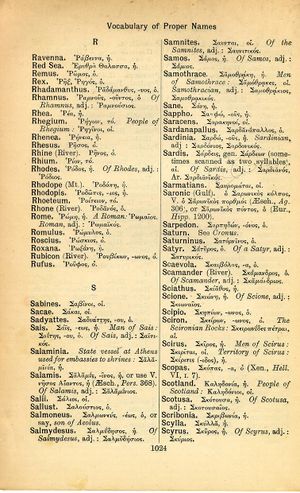Rhea: Difference between revisions
From LSJ
Πυλάδη, σε γὰρ δὴ πρῶτον ἀνθρώπων ἐγὼ πιστὸν νομίζω καὶ φίλον ξένον τ' ἐμοί → Pylades for indeed I consider you, foremost among men, loyal and kind and a host to me (Euripides' Electra 82-83)
(Names) |
(6_14) |
||
| Line 1: | Line 1: | ||
{{WoodhouseENELnames | {{WoodhouseENELnames | ||
|Text=[[File:woodhouse_1024.jpg|thumb|link={{filepath:woodhouse_1024.jpg}}]]Ῥέα, ἡ. | |Text=[[File:woodhouse_1024.jpg|thumb|link={{filepath:woodhouse_1024.jpg}}]]Ῥέα, ἡ. | ||
}} | |||
{{Lewis | |||
|lshtext=<b>Rhēa</b>: ae, f.,<br /><b>I</b> an old Italian [[name]]. Thus, [[Rhea]] [[Silvia]], [[daughter]] of [[Numitor]] and [[mother]] of [[Romulus]] and [[Remus]], Liv. 1, 3; Flor. 1, 1, 1; Prud. adv. Symm. 1, 174 (cf. Verg. A. 1, 276).—Hence [[comes]] the [[name]] of the fabled [[priestess]] [[Rhea]] in Verg. A. 7, 659.<br /><b>Rhĕa</b>: ae, f., = Ῥέα,><br /><b>I</b> [[another]] [[name]] for [[Cybele]], Ov. F. 4, 201: [[Rhea]], quae Latiis Ops, Aus. Idyll. 12 de Deis, 2. | |||
}} | }} | ||
Revision as of 09:04, 13 August 2017
English > Greek (Woodhouse)
Ῥέα, ἡ.
Latin > English (Lewis & Short)
Rhēa: ae, f.,
I an old Italian name. Thus, Rhea Silvia, daughter of Numitor and mother of Romulus and Remus, Liv. 1, 3; Flor. 1, 1, 1; Prud. adv. Symm. 1, 174 (cf. Verg. A. 1, 276).—Hence comes the name of the fabled priestess Rhea in Verg. A. 7, 659.
Rhĕa: ae, f., = Ῥέα,>
I another name for Cybele, Ov. F. 4, 201: Rhea, quae Latiis Ops, Aus. Idyll. 12 de Deis, 2.

